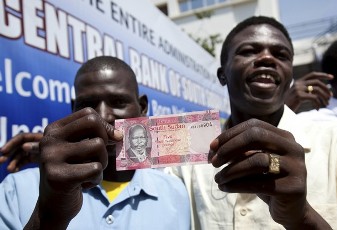South Sudan depletes local currency reserves: official
March 29, 2015 (JUBA) – South Sudan Central Bank officials have warned of a looming economic collapse after local currency reserves meant to last five years were depleted.

The official, who did not disclose how much money was exhausted, attributed the shrinking level of foreign reserves to reduction in oil production and the decline in global oil prices.
“Large budget deficits are also causing the pound to weaken. When foreign investors and currency traders perceive that rising levels of government spending are not sustainable and that the government will need to go to the market to prop up this spending, they sell and buy dollars, pushing down the value of the local currency”, further explained the US-trained South Sudanese economist.
According to the official, the Central Bank has suspended supplying commercial banks and forex bureaus with foreign currency until it obtains enough reserves to support its operation.
Defense and security officials, he said, were responsible for depleting local reserves and printing of more money allegedly to cover fiscal deficit in the annual budget.
“They exhausted local reserves and asked printing of more money before turning on foreign reserves,” he said, further alleging that those who depleted these local reserves and printed more money diverted these funds to their own accounts, resulting in the high demand for hard currency since they wanted to keep the value of the allegedly printed local currencies in United States dollars (USD).
Economic experts and analysts have warned that the current economic problem will not only affect conflict areas, but could spill over to neighboring regions and countries.
Economist James Mawut said the ongoing conflict could disrupt trade flows as government spending is diverted to non-productive security measures, while foreign direct investments might be shifted away from entire regions perceived as insecure.
“The overall negative effects of violent conflict on economic development are hence well documented and seem shaped by the nature of the conflict, duration, and geographical spread,” he said.
Other impacts on economic activity, Mawut added, include an unstable market exchange, heightened insecurity, threatened property rights, and the suppression of civil liberties result in an unsafe business environment.
“As transaction costs increases, trust deteriorates and economic activities are disrupted as the market exchange is limited in war-torn societies as well as other factors, including conflict-related deaths and injuries, emigration, displacement, and forced conscription reduce the available labor force and are likely to affect productivity,” he said.
In 2012, the Central Bank governor, Kornelio Koriom said South Sudan had sufficient local currencies in reserve to run the country for five years without printing any more money.
(ST)
